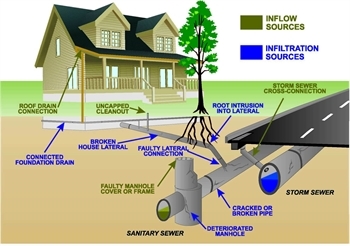 By Josh Ellis and MPC Research Assistant Jamie Makatche
By Josh Ellis and MPC Research Assistant Jamie Makatche - December 9, 2013
The Metropolitan Planning Council (MPC) recently commended the Metropolitan Water Reclamation Disctrict of Greater Chicago (MWRD) for its bold action on stormwater management. Despite MWRD’s desire to continue to innovate and improve its processes, its own legal structure prevents some positive changes from occurring. In order for MWRD to continue on this trajectory of positive change, Rep. Daniel Burke (D-Chicago) and Sen. Martin Sandoval (D-Chicago) sponsored House Bill 1551 (HB1551). The bill passed in the House in May 2013 and the Senate in November, and now waits until the legislature reconvenes in the spring, when it should move to concurrence. HB1551 is meant to achieve a much-needed update to the Metropolitan Water Reclamation District Act. Highlights of the proposed changes include the added ability of MWRD to:
1) Award grants to private property owners
With the vast majority of regional property being owned privately, it’s no secret that private property owners are key players in the success of green infrastructure. This update would enable MWRD to implement a green infrastructure grant program, such as MPC’s Milwaukee Avenue Green Development Corridor Project or the City of Chicago’s Sustainable Backyards Program.
2) Work on private lateral lines
The city of Chicago has a combined sewer system, meaning that all rainwater runoff, domestic sewage, and industrial wastewater are collected in the same pipe system. During a significant storm, the pipes may get too full of water and start to overflow into the city’s waterways. This process is called a combined sewer overflow, but it’s not the only way stormwater impacts our communities. Private lateral lines are the avenue through which wastewater and stormwater travel from individual homes and businesses to the centralized collection system. When lateral lines fail, it is possible for the collected water to flow back to the home and result in substantial property damage. By gaining access to work on private lateral lines, MWRD will be able to proactively solve this problem at the source.
3) Work on local storm/sewer systems

King County Wastewater Treatment Division
The wastewater and stormwater that MWRD treats comes to the treatment plants through wastewater collection systems that are owned and maintained by each city, village or sewer district in the Greater Chicago area. Unlike Chicago’s combined sewer system, many communities in the region have municipal separate storm sewer system, meaning that stormwater and wastewater are carried by separate pipes. Damage to the sewage pipes can cause groundwater to enter the pipes, which is known as infiltration. Additionally, when there is a leak in the stormwater pipes, the excess water can leak from the stormwater pipe into the sewage pipe, which causes inflow. This infiltration and inflow can cause the quantity of wastewater being treated by MWRD to increase dramatically. By gaining access to work on these local systems, MWRD will be able to perform much needed maintenance in both combined sewer and municipal separate storm sewer communities.
4) Acquire property
Many properties in the region are subject to constant basement back-ups. These properties can be difficult to sell or insure, and the reality is that the most effective solution may be for that household to move elsewhere and the property be demolished. By having the authority to acquire these properties, MWRD will be able to purchase hard-to-sell properties through wholly voluntary agreements with interested property owners and transform the land into space that is useful to the greater community.
By opening the doors to MWRD to better access key stormwater and wastewater management, HB 1551 streamlines the path to more efficient water use in our region. MPC supports HB 1551 and MWRD's commitment to expanding its options for managing Cook County's stormwater.
With passage in the Senate and House, HB 1551 is slated for a concurrence session, most likely in the spring. Follow the bill's progress here on our blog.